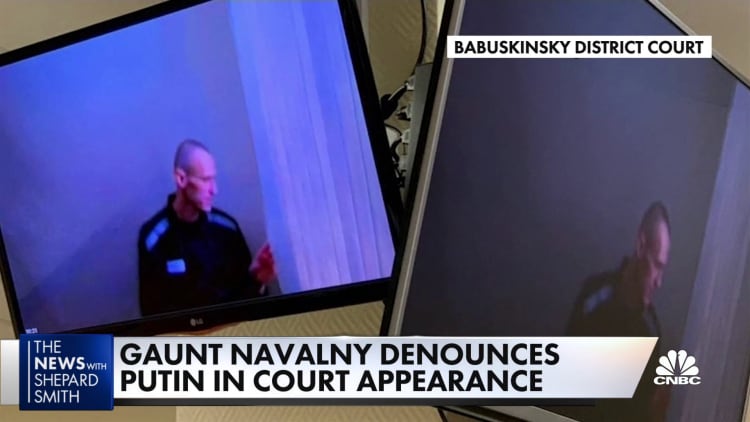A screen displays the imprisoned Russian opposition figure Alexei Navalny as he listens to his verdict on a series of extremism charges at the IK-6 penal colony. This maximum-security prison is located approximately 250 kilometers (155 miles) east of Moscow, in the settlement of Melekhovo in the Vladimir region on August 4, 2023.
Alexander Nemenov | Afp | Getty Images
Kremlin opposition leader Alexei Navalny’s team confirmed his sentencing to an additional 19 years in prison after being found guilty on a series of charges by a Russian court.
Navalny and his supporters deny the charges of inciting and financing “extremist activity” and “rehabilitating Nazi ideology.”
In a social media post, Navalny anticipated receiving a prison term reminiscent of the Stalin era. He also condemned Russia’s invasion of Ukraine, calling it “the most foolish and irrational war of the 21st century.”
Navalny, who is one of Russian President Vladimir Putin’s fiercest critics, had already been serving two prison sentences. He received a nine-year sentence for embezzlement and fraud, as well as over two years for a parole violation.
This latest sentence is Navalny’s third and longest prison term.
The Biden administration has pledged to continue advocating for Navalny and the “more than 500 other designated political prisoners being held by Russia.”
“For years, the Kremlin has tried to silence Navalny and prevent his calls for transparency and accountability from reaching the Russian people,” said State Department spokesman Matt Miller in a statement.
United Nations human rights chief Volker Turk has called for Navalny’s immediate release and criticized the “vague and overly broad charges.”
“The new sentence imposed on opposition figure Alexei Navalny today raises serious concerns about the abuse of the court system for political purposes in Russia,” wrote Turk in a statement.
Navalny has been detained at a remote penal colony since 2021. His detention followed a period of nearly six months in Germany, where he was recovering from a nerve agent poisoning in August 2020.
A month after the poisoning, the German government confirmed that Navalny had been exposed to a chemical nerve agent, with toxicology reports providing “clear evidence.” The nerve agent was identified as part of the Novichok family, which was originally developed by the Soviet Union. Toxicology tests conducted in France and Sweden also reached the same conclusion.
The Kremlin has continuously denied any involvement in Navalny’s poisoning.
In March 2021, the United States sanctioned seven members of the Russian government in response to the alleged poisoning and subsequent detention of Navalny. These sanctions were the first to specifically target Moscow under President Joe Biden’s administration.



